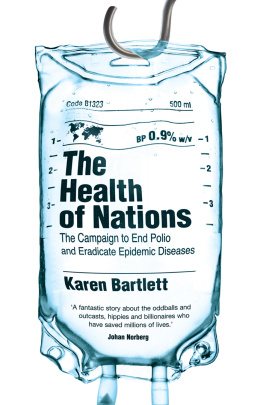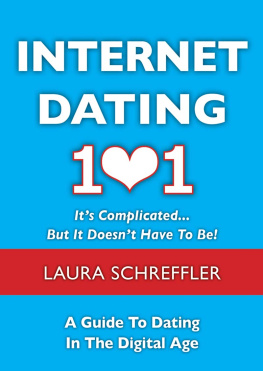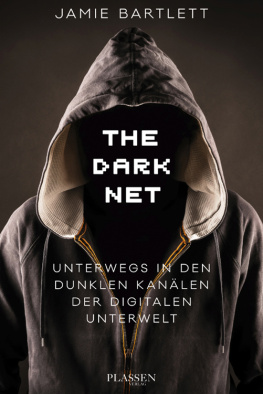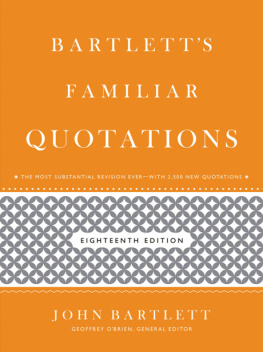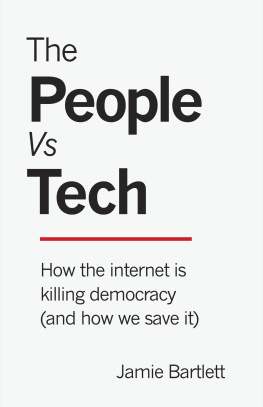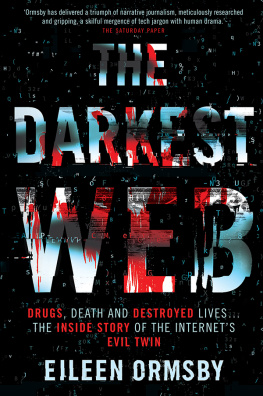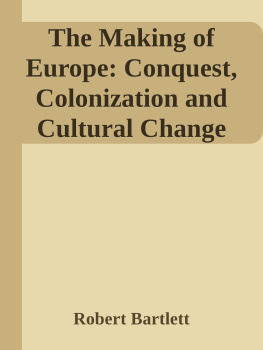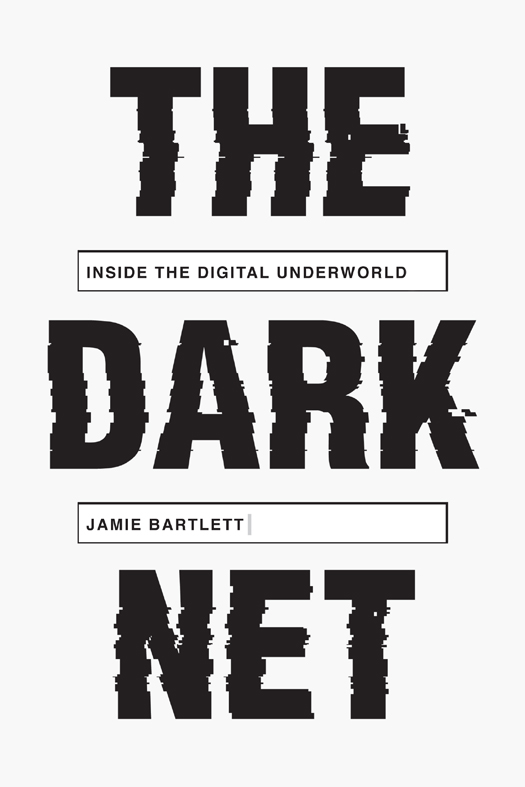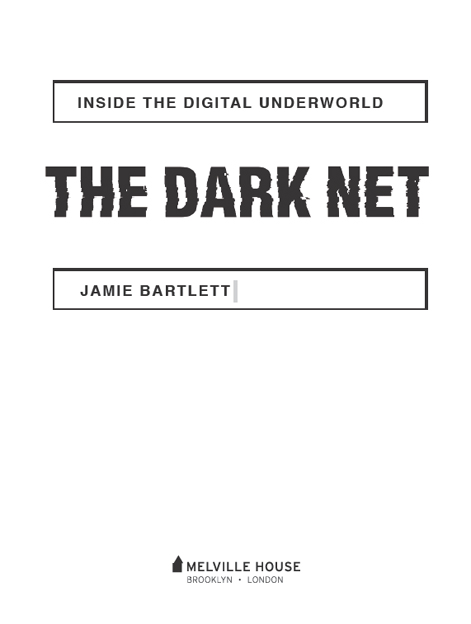THE DARK NET
Copyright 2014, 2015 by Jamie Bartlett
First published in Great Britain in 2014 by William Heinemann, an imprint of Random House
First Melville House Printing: June 2015
Melville House Publishing | 8 Blackstock Mews |
46 John Street | and | Islington |
Brooklyn, NY 11201 | London N4 2BT |
mhpbooks.com facebook.com/mhpbooks @melvillehouse
ISBN: 978-1-61219-489-9 (hardcover)
ISBN: 978-1-61219-490-5 (ebook)
Design by Adly Elewa
A catalog record for this book is available from the Library of Congress
v3.1
For Huey, Max, Sonny, and Thomas, who were born while I was writing this book. When they are old enough, I hope they will read it and wonder what on earth all the fuss was about, and laugh at their uncles hopeless predictions.
CONTENTS
AUTHORS NOTE
The Dark Net is an examination of what are, in many cases, extremely sensitive and contentious subjects. My primary aim was to shine a light on a world that is frequently discussed, but rarely exploredoften for good reason. Throughout I have endeavored to set my own views aside and write as objective and as lucid an account of what I experienced as possible. Some readers may question the wisdom of writing about this subject at all, and express concern at the information The Dark Net reveals. Although my intention was never to provide a guide to illegal or immoral activity online, this book does contain material that some will find shocking and offensive.
As a researcher I felt a duty to respect the privacy of the people I encountered. Where necessary, I have altered names, online pseudonyms, and identifying details, and, in one chapter, created a composite character based on several individuals. For the readers ease, I have also corrected many (but not all) spelling mistakes in quoted material.
I have tried to balance the rights of individuals with the social benefit that I believe comes from describing them and the worlds they inhabit. It is not a foolproof method; rather a series of judgments. Any errors, omissions, and mistakes are mine alone, and I hope those included in this book will accept my apologies in advance for any distress or discomfort caused.
Online life moves quickly. By the time you read The Dark Net, certain parts of these stories will have changed, websites will have closed down, subcultures will have evolved, new laws will have been enacted. But its core themewhat humans do under the conditions of real or perceived anonymity onlinewill certainly have not.
JAMIE BARTLETT
March 2015
INTRODUCTION
LIBERTY OR DEATH
I have heard rumors about this website, but I still cannot quite believe that it exists. I am looking at what I think is a hit list. There are photographs of people I recognizeprominent politicians, mostlyand, next to each, an amount of money. The sites creator, who uses the pseudonym Kuwabatake Sanjuro, thinks that if you could pay to have someone murdered with no chanceI mean absolutely zero chanceof being caught, you would. Thats one of the reasons why he has created the Assassination Market. There are four simple instructions listed on its front page:
>Add a name to the list
>Add money to the pot in the persons name
>Predict when that person will die
>Correct predictions get the pot
The Assassination Market cant be found with a Google search. It sits on a hidden, encrypted part of the internet that, until recently, could only be accessed with a browser called The Onion Router, or Tor. To put it simply, Tor works by repeatedly encrypting computer activity and routing it via several network nodes, or onion routers, in so doing concealing the origin, destination, and content of the activity. Users of Tor are untraceable, as are the websites, forums, and blogs that exist as Tor Hidden Services, which use the same traffic encryption system to cloak their location.
The Assassination Market may be hosted on an unfamiliar part of the net, but its easy enough to find, if you know how to look. All thats required is simple (and free) Tor software. Then sign up, follow the instructions, and wait. It is impossible to know the number of people who are doing exactly that, but at the time of writing, if I correctly predict the date of the death of Ben Bernanke, the former chairman of the Federal Reserve, Id receive approximately $56,000.
It may seem like a fairly pointless bet. Its very difficult to guess when someone is going to die. Thats why the Assassination Market has a fifth instruction:
>Making your prediction come true is entirely optional
THE DARK NET
The Assassination Market is a radical example of what people do online when under the cover of real or perceived anonymity. Beyond the more familiar world of Google, Hotmail, and Amazon lies another side to the internet: the dark net.
For some, the dark net refers to the encrypted world of Tor Hidden Services, where users cannot be traced, and cannot be identified. For others, it is those sites not indexed by conventional search engines: an unknowable realm of password-protected pages, unlinked websites, and hidden content accessible only to those in the know, sometimes referred to as the deep web. It has also become a catchall term for the myriad shocking, disturbing, and controversial corners of the netthe realm of imagined criminals and lurking predators.
The dark net, for me, describes an idea more than a particular place: internet underworlds set apart yet connected to the internet we inhabit, worlds of freedom and anonymity, where users say and do what they like, often uncensored, unregulated, and outside of societys norms. It is dark because we rarely see these parts of digital life, save the occasional flash of a hysterical news report or shocking statistic. This is not a book about Tor, since the net is full of obscure corners, of secret back alleys on parts of the internet you likely already know: social media sites, normal websites, forums, chat rooms. I focus instead on those digital cultures and communities that appear, to those that arent part of them, dark, insidious, and beyond societys gazewherever I found them.
This dark net is rarely out of the newswith stories of young people sharing homemade pornography, of cyberbullies and trolls tormenting strangers, of hackers stealing and leaking personal photos, of political or religious extremists peddling propaganda, of illegal goods, drugs, and confidential documents only a click or two away appearing in headlines almost dailybut it is still a world that is, for the most part, unexplored and little understood. In reality, few people have ventured into the darker recesses of the net to study these sites in any detail.
I started researching radical social and political movements in 2007, when I spent two and a half years following Islamist extremists around Europe and North America, trying to piece together a fragmented and largely disjointed real-world network of young men who sympathized with al-Qaeda ideology. By the time Id finished my work in 2010, the world seemed to be different. Every new social or political phenomenon I encounteredfrom conspiracy theorists to far-right activists to drug cultureswas increasingly located and active online. I would frequently interview the same person twiceonce online and then again in real lifeand feel as if I was speaking to two different people. I was finding parallel worlds with different rules, different patterns of behavior, different protagonists. Every time I thought Id reached the bottom of one online culture, I discovered other connected, secretive realms still unexplored. Some required a level of technical know-how to access, some were extremely easy to find. Although an increasingly important part of many peoples lives and identities, these online spaces are mostly invisible: out of reach and out of view. So I went in search of them.


